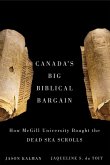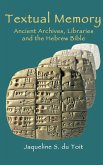

Gebundenes Buch
Ancient Archives, Libraries and the Hebrew Bible
9. August 2011
Sheffield Phoenix Press
Ähnliche Artikel

eBook, PDF
10. März 2004
McGill-Queen's University Press

44,75 €**
36,95 €
**Preis der gedruckten Ausgabe (Broschiertes Buch)
Sofort per Download lieferbar
VersandkostenfreieBook, PDF
18. Januar 2019
Peter Lang Inc., International Academic Publishers


7,49 €
inkl. MwSt. und vom Verlag festgesetzt.
Sofort per Download lieferbar
eBook, PDF
1. Dezember 2020
Clube de Autores

7,49 €
inkl. MwSt. und vom Verlag festgesetzt.
Sofort per Download lieferbar
eBook, PDF
30. November 2020
Clube de Autores

4,49 €
inkl. MwSt. und vom Verlag festgesetzt.
Sofort per Download lieferbar

7,49 €
inkl. MwSt. und vom Verlag festgesetzt.
Sofort per Download lieferbar
eBook, PDF
30. November 2020
Clube de Autores

7,49 €
inkl. MwSt. und vom Verlag festgesetzt.
Sofort per Download lieferbar
eBook, PDF
23. November 2020
Clube de Autores

7,49 €
inkl. MwSt. und vom Verlag festgesetzt.
Sofort per Download lieferbar
eBook, PDF
1. Dezember 2020
Clube de Autores

7,49 €
inkl. MwSt. und vom Verlag festgesetzt.
Sofort per Download lieferbar
eBook, PDF
26. November 2020
Clube de Autores
Ähnlichkeitssuche: Fact®Finder von OMIKRON
